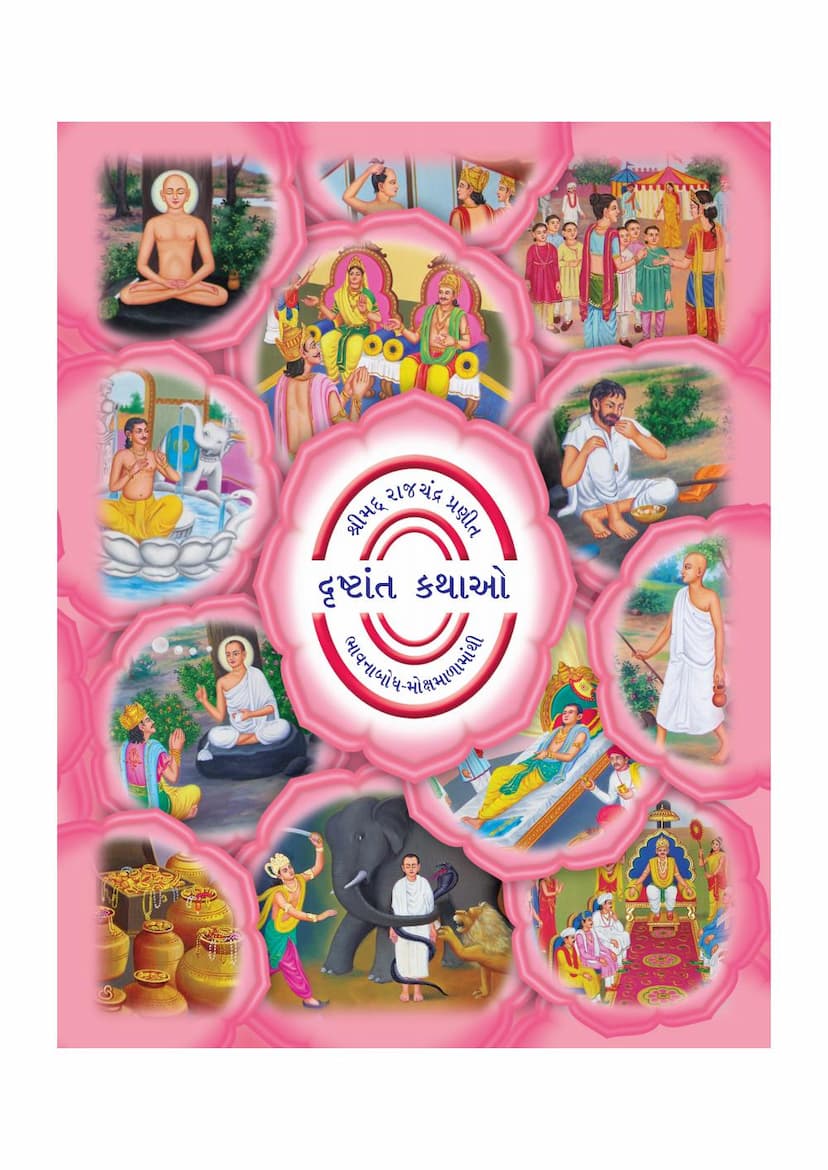Drushtant Kathao
Added to library: September 1, 2025

Summary
This document summarizes "Drushtant Kathao," a book derived from Shrimad Rajchandra's "Bhavanabodh" and "Mokshmala," translated into English by Dinubhai M. Patel. The book's primary aim is to foster detachment from worldly pleasures and attachments, leading to self-realization and liberation from suffering.
The book presents twelve "Bhavanas" (sentiments or contemplations), each illustrated with stories and colorful pictures. These Bhavanas are considered the "mother of all detachments" and are crucial for spiritual growth. The preface highlights the importance of overcoming Anger, Pride, Deceit, and Greed to achieve true detachment and self-realization, which are essential for freedom from misery.
Here's a summary of the Bhavanas and their associated stories presented in the provided pages:
From Bhavanabodh:
-
Anitya Bhavana (Contemplation of Transience):
- Meaning: Everything in the world is temporary, like lightning, waves, or a rainbow.
- Story: "Dejection of a Beggar." A beggar dreams of wealth and royalty but wakes up to find his reality unchanged. This experience makes him realize the fleeting nature of worldly pleasures, leading to dejection. The lesson is that worldly pleasures are like dreams, offering temporary satisfaction but ultimately leading to disappointment and downfall.
-
Asharan Bhavana (Feeling of Helplessness):
- Meaning: In the cycle of birth and death, there is no true savior except the teachings of the omniscient Jain Tirthankaras.
- Story: "Anathi Muni." King Shrenik encounters a young ascetic (Anathi Muni) who explains his choice of an ascetic life by detailing his past helplessness when facing severe illness, despite his wealthy family's inability to cure him. He argues that King Shrenik, too, is an "orphan" in the grand scheme of existence, as worldly possessions and relationships cannot truly protect one from suffering. The ascetic emphasizes that the soul itself is the creator of both bondage and liberation.
-
Ekatva Bhavana (Contemplation of Singleness):
- Meaning: One experiences pains and the fruits of one's actions alone. Life is a journey of the soul, and one ultimately departs alone.
- Story: "Nami Raj and Shakrendra." King Nami, a philosopher-king, engages in a debate with Shakrendra (Indra in disguise) who tries to dissuade him from asceticism by highlighting worldly allurements. Nami consistently counters, emphasizing the transient nature of worldly possessions and the importance of inner strength and detachment. The story also includes a related anecdote of Nami realizing loneliness from the sound of bangles, leading to a profound understanding of singleness.
-
Anyatva Bhavana (Nothing is Mine):
- Meaning: All worldly possessions, relationships, and even the body are not truly "mine."
- Story: "King of Kings Bharateshwar." Bharat, a powerful and wealthy emperor, realizes the impermanence of his possessions and his body's dependence on external elements for beauty. Through the analogy of a ring falling off a finger, he understands that his perceived beauty and identity are external. This realization leads him to abandon his worldly life and attain Keval Gyan (perfect knowledge).
-
Ashuchi Bhavana (Contemplation of Impurity):
- Meaning: The body is impure, a source of disease and decay, and only the soul is pure.
- Story: "Chakravarti Sanatkumar." King Sanatkumar, praised for his beauty, is tested by deities who reveal the transient and poisonous nature of his body, especially when pride enters. He later contracts leprosy, and when a deity offers to cure his physical ailment but not his spiritual bondage, Sanatkumar realizes the true impurity of the body. He uses his own spittle to cure his leprosy, demonstrating the power of self-reliance and detachment. The human body is seen as the best tool for self-realization, but it remains inherently impure.
-
Nivrutti Bodh (Preaching of Retirement from Worldly Matters):
- Meaning: Detachment from worldly pursuits and embracing a spiritual path is essential for true happiness.
- Story: "Mrugaputra." Prince Mrugaputra, despite living a life of luxury, is drawn to a saint. Recalling his past lives filled with immense suffering in hell, he renounces his royal life to become an ascetic. His parents try to dissuade him by emphasizing the difficulties of asceticism, but Mrugaputra, drawing parallels with the natural resilience of a deer, expresses his determination to endure hardships for spiritual liberation.
The book also lists questions from "Mokshmala" related to stories like Sudarshan Seth, Gajsukumar, Kapil Muni, and Good Bhil, suggesting that these stories are also part of the collection and serve to illustrate similar spiritual lessons. The overall tone and purpose of the book are to guide the reader towards a life of detachment, self-awareness, and ultimately, spiritual enlightenment.